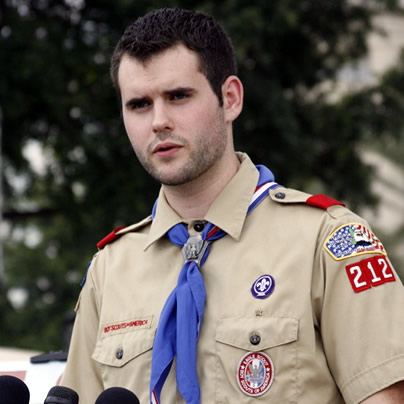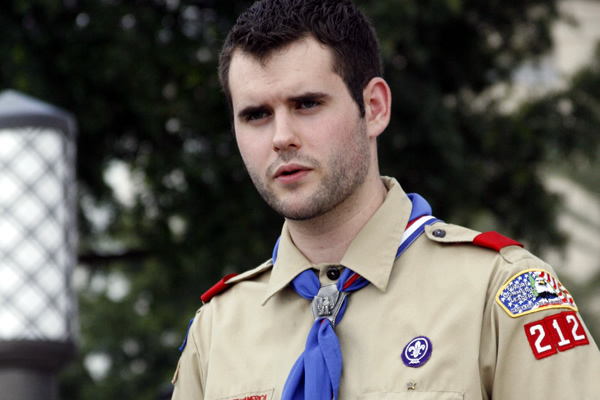National
Mixed reaction to Boy Scouts plan on gay members
Critic says Sandusky would be new ‘poster boy’ for group


‘This would be an incredible step forward in the right direction,’ said Zach Wahls, an Eagle Scout and founder of the group Scouts for Equality. (Photo courtesy of Change.org)
A statement issued by the Boy Scouts of America on Monday saying the organization is considering dropping its national policy banning gay scouts and scout leaders was hailed by LGBT advocates as an important breakthrough in the fight for equality.
But two of the nation’s leading anti-gay groups warned that if the BSA’s board votes next week to drop its ban on gays, as predicted by sources familiar with the Boy Scouts, it would lead to a “mass exodus” of scouts and scout leaders from traditional, religious-oriented families and communities.
In its statement released on Monday, the BSA said the change it was considering would allow the religious, civic and educational organizations that are chartered to operate scouting units throughout the country to make the final decision on whether or not to accept gays.
“Currently, the BSA is discussing potentially removing the national membership restriction regarding sexual orientation,” the statement says.
“This would mean there would no longer be any national policy regarding sexual orientation, and the chartered organizations that oversee and deliver Scouting would accept membership and select leaders consistent with each organization’s mission, principles, or religious beliefs,” says the statement.
“BSA members and parents would be able to choose a local unit that best meets the needs of their families,” it says.
NBC News, which first reported that BSA was considering lifting its gay ban prior to the release of the statement, also reported that the organization was expected to approve the changes at a board of directors meeting within the next week.
Janelle Moritz, a public relations representative for the Boy Scouts of America, told the Blade she could not confirm the NBC report about the timing of a board meeting or what the board would decide. She said BSA would not comment on the matter beyond what it said in its statement, which doesn’t say when the group will decide on the issue.
Other news media outlets, however, reported that BSA sources confirmed that the board meeting would take place next week, mostly likely at the BSA national headquarters in Irving, Texas.
“The Boy Scouts of America have heard from scouts, corporations, and millions of Americans that discriminating against gay scouts and scout leaders is wrong,” said Herndon Graddick, president of the Gay and Lesbian Alliance Against Defamation. “Scouting is a valuable institution and this change will only strengthen its core principles of fairness and respect,” he said.
“This would be an incredible step forward in the right direction,” said Zach Wahls, an Eagle Scout and founder of the group Scouts for Equality. “We look forward to working with BSA Councils and chartering organizations across the country to end the exclusion of our gay brothers in scouting, as well as the gay and lesbian leaders who serve the organizations so well.”
Chad Griffin, president of the Human Rights Campaign, said the Boy Scouts’ expected policy change follows the growing support for LGBT equality from the American people.
“The pulse of equality is strong in America, and today it beats a bit faster with news that the Boy Scouts may finally put an end to its long history of discrimination,” Griffin said in a statement. “Our nation and its leaders respect lesbian, gay, bisexual and transgender citizens, and it’s time the Boy Scouts echo those values.”
A far different response emerged from leaders of the Family Research Council and the American Family Association, two national conservative groups that oppose LGBT rights.
“The Boy Scouts of America board would be making a serious mistake to bow to the strong-arm tactics of LGBT activists and open the organization to homosexuality,” said FRC President Tony Perkins in a statement.
“The mission of the Boy Scouts is to ‘instill values in young people’ and ‘prepare them to make ethical choices,’ and the Scouts’ oath includes a pledge ‘to do my duty to God’ and keep himself ‘morally straight,” he said. “It is entirely reasonable and not at all unusual for those passages to be interpreted as requiring abstinence from homosexual conduct.”
The American Family Associated posted on its website a column by anti-gay advocate Bryan Fischer, who quipped that Jerry Sandusky, the former Penn State assistant coach convicted on child molestation charges, would become “the new poster boy” for the Boy Scouts.
“This move, unless the BSA dramatically reverses itself in the immediate future, represents the capitulation to the forces of sexual deviancy,” he said. “The Scouts will have made a deliberate decision to put the sexual integrity of every young man in their care at risk.”
Within a day of the BSA’s announcement that it was considering changing its policy on gay scouts and scout leaders, the FRC and the American Family Association posted appeals on their websites urging members and supporters to call the BSA to urge the group to leave its ban on gays in place.
“As the BSA board meets next week, it is crucial that they hear from those who stand with them and their current policy regarding homosexuality,” FRC said.
Possibly in anticipation of strong opposition by conservative and religious groups, the BSA emphasized in its own statement that the change would allow local units to decide whether or not to admit gays.
“The Boy Scouts would not, under any circumstances, dictate a policy to units, members, or parents,” the statement says. “Under this proposed policy, the BSA would not require any chartered organization to act in ways inconsistent with that organization’s mission, principles or religious beliefs.”
The BSA website says more than 100,000 scouting units are owned and operated by independent chartered organizations.
“Of these, 64.9 percent of all units are chartered to faith-based organizations, 22.7 percent of all units are chartered to civic organizations, and 7.9 percent of all units are chartered to educational organizations,” it says.
It says the chartered organizations are responsible for providing meeting facilities, providing “quality leadership for the scouting unit,” and appointing a representative to coordinate unit operations
A list of BSA chartered organizations posted on its website shows a wide range of religious and civic groups that are likely to differ on whether or not to admit gay scouts and scout leaders.
Among them are the Catholic Church, the Church of Jesus Christ of Latter-day Saints, and “Baptist Churches,” which traditionally have condemned homosexuality. Others, however, include the United Church of Christ, the Episcopal Church, United Methodist Church and Lutheran churches, which have had more accepting policies toward LGBT people.
Civic groups listed on the BSA website as chartered organizations include local Chambers of Commerce, Lions and Rotary clubs, American Legion organizations, Boys’ and Girls’ Clubs, YMCA groups, “non-profit agencies,” and “home owners” groups.
The BSA’s statement saying it is considering removing its national policy banning gay scouts and scout leaders comes seven months after the BSA announced it had conducted a two-year review of the ban and decided to leave it in place.
Monday’s announcement also comes after several prominent corporations, including United Parcel Service and Intel Corporation, withdrew as BSA financial sponsors, saying the gay ban violated their corporate polices of non-discrimination based on sexual orientation.
Others opposing the Boy Scouts ban on gays have organized online petition drives that have gathered hundreds of thousands of signatures calling on the BSA to drop its gay ban.
Among those drawing attention to efforts to end the ban is Eagle Scout Wahls of Iowa, who is straight but has spoken publically about his two lesbian moms.
http://www.youtube.com/watch?v=Rrsn33RstKI
Sharon Brackett, co-founder and board chair of the statewide transgender advocacy organization Gender Rights Maryland, said she experienced firsthand how at least some Boy Scout troops and the chartered organizations that operate them are LGBT supportive.
Brackett said she served as a scout master for the local Boy Scout troop in Savage, Md., where her sons were members, before she transitioned from male to female. She said after taking a break during her transition period, the troop and a local Methodist church that served as the chartered organization, welcomed her back once she completed her gender transition.
“My experience has been positive,” she said, noting that women have long served as Boy Scout troop leaders and officials in the chartered organization covering her area had no problem with her coming back.
Brackett said she supports the proposed change by the BSA to leave it up to the chartered organizations to decide whether gay scouts or troops can be admitted. At least in Maryland, she said, there are enough local troops and chartered organizations to choose from that would result in gay youth finding one that will be welcoming.
“Having that choice is the best next step for us at this time,” she said.
U.S. Supreme Court
Supreme Court to consider bans on trans athletes in school sports
27 states have passed laws limiting participation in athletics programs

The U.S. Supreme Court on Thursday agreed to hear two cases involving transgender youth challenging bans prohibiting them from participating in school sports.
In Little v. Hecox, plaintiffs represented by the ACLU, Legal Voice, and the law firm Cooley are challenging Idaho’s 2020 ban, which requires sex testing to adjudicate questions of an athlete’s eligibility.
The 9th U.S. Circuit Court of Appeals described the process in a 2023 decision halting the policy’s enforcement pending an outcome in the litigation. The “sex dispute verification process, whereby any individual can ‘dispute’ the sex of any female student athlete in the state of Idaho,” the court wrote, would “require her to undergo intrusive medical procedures to verify her sex, including gynecological exams.”
In West Virginia v. B.P.J., Lambda Legal, the ACLU, the ACLU of West Virginia, and Cooley are representing a trans middle school student challenging the Mountain State’s 2021 ban on trans athletes.
The plaintiff was participating in cross country when the law was passed, taking puberty blockers that would have significantly reduced the chances that she could have a physiological advantage over cisgender peers.
“Like any other educational program, school athletic programs should be accessible for everyone regardless of their sex or transgender status,” said Joshua Block, senior counsel for the ACLU’s LGBTQ and HIV Project. “Trans kids play sports for the same reasons their peers do — to learn perseverance, dedication, teamwork, and to simply have fun with their friends,” Block said.
He added, “Categorically excluding kids from school sports just because they are transgender will only make our schools less safe and more hurtful places for all youth. We believe the lower courts were right to block these discriminatory laws, and we will continue to defend the freedom of all kids to play.”
“Our client just wants to play sports with her friends and peers,” said Lambda Legal Senior Counsel Tara Borelli. “Everyone understands the value of participating in team athletics, for fitness, leadership, socialization, and myriad other benefits.”
Borelli continued, “The U.S. Court of Appeals for the Fourth Circuit last April issued a thoughtful and thorough ruling allowing B.P.J. to continue participating in track events. That well-reasoned decision should stand the test of time, and we stand ready to defend it.”
Shortly after taking control of both legislative chambers, Republican members of Congress tried — unsuccessfully — to pass a national ban like those now enforced in 27 states since 2020.
Federal Government
UPenn erases Lia Thomas’s records as part of settlement with White House
University agreed to ban trans women from women’s sports teams

In a settlement with the Trump-Vance administration announced on Tuesday, the University of Pennsylvania will ban transgender athletes from competing and erase swimming records set by transgender former student Lia Thomas.
The U.S. Department of Education’s Office for Civil Rights found the university in violation of Title IX, the federal rights law barring sex based discrimination in educational institutions, by “permitting males to compete in women’s intercollegiate athletics and to occupy women-only intimate facilities.”
The statement issued by University of Pennsylvania President J. Larry Jameson highlighted how the law’s interpretation was changed substantially under President Donald Trump’s second term.
“The Department of Education OCR investigated the participation of one transgender athlete on the women’s swimming team three years ago, during the 2021-2022 swim season,” he wrote. “At that time, Penn was in compliance with NCAA eligibility rules and Title IX as then interpreted.”
Jameson continued, “Penn has always followed — and continues to follow — Title IX and the applicable policy of the NCAA regarding transgender athletes. NCAA eligibility rules changed in February 2025 with Executive Orders 14168 and 14201 and Penn will continue to adhere to these new rules.”
Writing that “we acknowledge that some student-athletes were disadvantaged by these rules” in place while Thomas was allowed to compete, the university president added, “We recognize this and will apologize to those who experienced a competitive disadvantage or experienced anxiety because of the policies in effect at the time.”
“Today’s resolution agreement with UPenn is yet another example of the Trump effect in action,” Education Secretary Linda McMahon said in a statement. “Thanks to the leadership of President Trump, UPenn has agreed both to apologize for its past Title IX violations and to ensure that women’s sports are protected at the university for future generations of female athletes.”
Under former President Joe Biden, the department’s Office of Civil Rights sought to protect against anti-LGBTQ discrimination in education, bringing investigations and enforcement actions in cases where school officials might, for example, require trans students to use restrooms and facilities consistent with their birth sex or fail to respond to peer harassment over their gender identity.
Much of the legal reasoning behind the Biden-Harris administration’s positions extended from the 2020 U.S. Supreme Court case Bostock v. Clayton County, which found that sex-based discrimination includes that which is based on sexual orientation or gender identity under Title VII rules covering employment practices.
The Trump-Vance administration last week put the state of California on notice that its trans athlete policies were, or once were, in violation of Title IX, which comes amid the ongoing battle with Maine over the same issue.
New York
Two teens shot steps from Stonewall Inn after NYC Pride parade
One of the victims remains in critical condition

On Sunday night, following the annual NYC Pride March, two girls were shot in Sheridan Square, feet away from the historic Stonewall Inn.
According to an NYPD report, the two girls, aged 16 and 17, were shot around 10:15 p.m. as Pride festivities began to wind down. The 16-year-old was struck in the head and, according to police sources, is said to be in critical condition, while the 17-year-old was said to be in stable condition.
The Washington Blade confirmed with the NYPD the details from the police reports and learned no arrests had been made as of noon Monday.
The shooting took place in the Greenwich Village neighborhood of Manhattan, mere feet away from the most famous gay bar in the city — if not the world — the Stonewall Inn. Earlier that day, hundreds of thousands of people marched down Christopher Street to celebrate 55 years of LGBTQ people standing up for their rights.
In June 1969, after police raided the Stonewall Inn, members of the LGBTQ community pushed back, sparking what became known as the Stonewall riots. Over the course of two days, LGBTQ New Yorkers protested the discriminatory policing of queer spaces across the city and mobilized to speak out — and throw bottles if need be — at officers attempting to suppress their existence.
The following year, LGBTQ people returned to the Stonewall Inn and marched through the same streets where queer New Yorkers had been arrested, marking the first “Gay Pride March” in history and declaring that LGBTQ people were not going anywhere.
New York State Assemblywoman Deborah Glick, whose district includes Greenwich Village, took to social media to comment on the shooting.
“After decades of peaceful Pride celebrations — this year gun fire and two people shot near the Stonewall Inn is a reminder that gun violence is everywhere,” the lesbian lawmaker said on X. “Guns are a problem despite the NRA BS.”




















